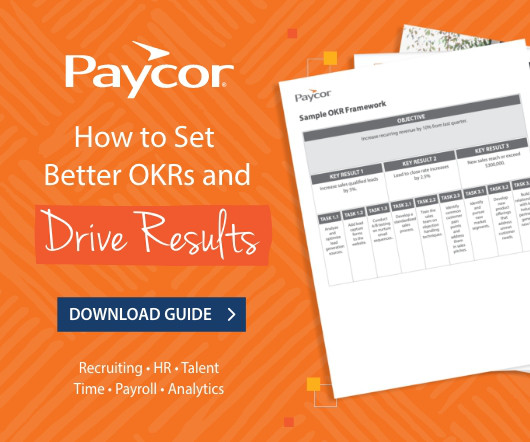To Save or Not to Save.Americans Show Some Regret Over Question
Insightful Accountant
JULY 30, 2023
According to a Bankrate study, 74% of Americans have a financial regret, most frequently not saving for retirement early enough

Insightful Accountant
JULY 30, 2023
According to a Bankrate study, 74% of Americans have a financial regret, most frequently not saving for retirement early enough

Accounting Tools
JULY 30, 2023
Related Courses Accounting for Income Taxes What is an Intraperiod Tax Allocation? An intraperiod tax allocation is the allocation of income taxes to different parts of the results appearing in the income statement of a business, so that some line items are stated net of tax. This situation arises in the following cases: Continuing operations (results of) are presented net of tax Discontinued operations are presented net of tax Prior period adjustments are presented net of tax The cumulative eff
This site is protected by reCAPTCHA and the Google Privacy Policy and Terms of Service apply.

Insightful Accountant
JULY 30, 2023
Looking for a quick way to find reference articles within Insightful Accountant related to QuickBooks Enterprise Advanced features? Well, Murph has gathered a list of the most read articles regarding each feature.

Accounting Tools
JULY 30, 2023
Related Courses 7 Habits of Effective Controllers Controller Education Bundle New Controller Guidebook The controller and comptroller titles refer to the same position, which is the person responsible for all accounting operations of a business. The controller title is more frequently found in for-profit businesses, while the comptroller title is more commonly found in governmental and non-profit organizations.

Speaker: Victor C. Barnes, CPA, MBA
In the climb from contributor to leader, the rules quietly change. But if you’re aiming for the summit, the air gets thinner, and what got you here won’t be enough to get you to the top. 🗻 What made you successful early in your finance career—technical accuracy, sharp analysis, flawless execution—won’t be what carries you to the next level. The higher you go, the more your effectiveness depends on how you connect, adapt, and communicate.

Ontrack Bookkeeping
JULY 30, 2023
As a small business owner, you may be considering enabling a remote work environment. With the rise of technology and the pandemic shifting the way we work, managing a remote team has become a popular option for business owners looking for new and unique ways to grow their business. We have certainly embraced it here at Ontrack Bookkeeping Ltd. There are however both benefits and drawbacks to consider before making the switch.

Accounting Tools
JULY 30, 2023
Related Courses How to Conduct a Compilation Engagement How to Conduct a Review Engagement How to Conduct an Audit Engagement What are Audit Procedures? Audit procedures are used by auditors to determine the quality of the financial information being provided by their clients, resulting in the expression of an auditor’s opinion. The exact procedures used will vary by client, depending on the nature of the business and the audit assertions that the auditors want to prove.
Financial Ops World brings together the best financial operations content from the widest variety of thought leaders.

Accounting Tools
JULY 30, 2023
Related Courses The Balance Sheet The Interpretation of Financial Statements What is Capital in Excess of Par? Capital in excess of par is the amount paid by investors to a company for its stock , in excess of the par value of the stock. Par value is the legal capital per share, and is usually printed on the face of the stock certificate. Since par value is usually a very small amount per share, such as $0.01, most of the amount paid by investors is usually classified as capital in excess of par

Insightful Accountant
JULY 30, 2023
EFK CompuBooks Inc.'s Esther Friedberg Karp joins Insightful Accountant's Gary DeHart to talk QuickBooks International, and more. Check out the latest edition of the Accounting Insiders' podcast here.

Accounting Tools
JULY 30, 2023
Related Courses Accounting for Inventory Cost Accounting Fundamentals What is Fixed Overhead? Fixed overhead is a set of costs that do not vary as a result of changes in activity. These costs are needed in order to operate a business. One should always be aware of the total amount of fixed overhead costs that a business incurs, so that management can plan to generate a sufficient amount of contribution margin from the sale of products and services to at least offset the amount of fixed overhead.

Accounting Tools
JULY 30, 2023
Related Courses Cost Accounting Fundamentals What is Cost Classification? Cost classification involves the separation of a group of expenses into different categories. A classification system is used to bring to management's attention certain costs that are considered more crucial than others, or to engage in financial modeling. Several types of cost classifications are noted below.

Speaker: Kim Beynon, CPA, CGMA, PMP
The most overlooked, yet most critical, element of transformation is preparing people for change. Automation and AI aren't just technical upgrades, they’re cultural shifts which can challenge identities. That’s why change management isn’t a side project—it’s the foundation. In finance, where precision and process rule, navigating change can feel especially disruptive.

Accounting Tools
JULY 30, 2023
Related Courses Bookkeeping Guidebook How to Audit Revenue Revenue Recognition What is Contra Revenue? Contra revenue is a deduction from the gross revenue reported by a business, which results in net revenue. Contra revenue transactions are recorded in one or more contra revenue accounts, which usually have a debit balance (as opposed to the credit balance in the typical revenue account).

Accounting Tools
JULY 30, 2023
Related Courses Financial Analysis Mergers and Acquisitions The Interpretation of Financial Statements What is Adjusted EBITDA? Adjusted EBITDA introduces additional elements into the standard EBITDA calculation, subtracting all non-cash charges for share-based compensation , as well as other one-time expenditures. This approach is used to normalize the reported results of the companies included in an industry analysis.

Accounting Tools
JULY 30, 2023
Related Courses Human Resources Guidebook Optimal Accounting for Payroll Payroll Management What is Piecework? Piecework is a compensation arrangement under which employees or third parties are paid based on the number of units produced. Under this arrangement, a standard amount is paid for each unit produced. Where there are minimum wage laws in effect, the minimum wage must still be paid to employees, irrespective of the number of units produced.

Accounting Tools
JULY 30, 2023
Related Courses Divestitures and Spin-Offs Mergers and Acquisitions What is a Corporate Raider? A corporate raider is an investor who intends to generate a return by acquiring the shares of existing shareholders in order to take control of a public company and enhance its value. They target undervalued companies that (they believe) can be redirected to enhance their valuations.

Speaker: Mark Gilham, FCCA, CPP
Finance used to be the function that counted, now it's the one that’s counted on. 📊 For accounting firms, controllers, and finance leaders, expectations are rising faster than headcount. Businesses want agile forecasts, granular analysis, seamless reporting, and smart automation—often without added resources while demanding uncompromised accuracy and compliance.

Accounting Tools
JULY 30, 2023
Related Courses Records Management What is Records Management? Records management is an organized approach to the administration of documents throughout their life cycle. These activities address the creation, classification, storage, and disposition of records. The documents administered through records management include anything produced as the result of a business transaction.

Accounting Tools
JULY 30, 2023
Related Courses Corporate Cash Management Corporate Finance Investing Guidebook What are Equities? Equities are financial instruments that give their holders an ownership position in a corporation. Examples of equities are common stock and preferred stock. Equities give their holders a proportionate claim to the profits and assets of a company, usually in the form of dividends and final distributions.

Accounting Tools
JULY 30, 2023
Related Courses Financial Analysis Investing Guidebook The Interpretation of Financial Statements What is the Price to Cash Flow Ratio? The price to cash flow ratio compares a stock price to its operating cash flow per share. The ratio is used by investors to estimate the amount of cash flow that may be available for distribution to them as dividends , and also as a comparison to other potential investments.

Accounting Tools
JULY 30, 2023
Related Courses The Income Statement What is Year-to-Date? Year-to-date refers to the cumulative balance appearing in an income statement account for the current year, through the end of the most recent reporting period. Thus, for financial statements using the calendar year , the concept refers to the period between January 1 and the current date. Year-to-date balances are typically presented for revenue , expense , gain , or loss accounts, and are compared to year-to-date information for the p

Advertiser: Paycor
Great leadership development is the key to sustainable business growth. Are you ready to design an effective program? HR can use Paycor’s framework to: Set achievable goals. Align employee and company needs. Support different learning styles. Empower the next generation of leaders. Invest in your company’s future with a strong leadership development program.

Accounting Tools
JULY 30, 2023
What is a Packing List? A packing list is a detailed statement of the contents of a package, which is used by the recipient to verify the contents. A packing list typically includes a description, quantity, and weight for each item in a package. It does not include the prices of the items being delivered. It is prepared by the seller, which includes it in the package or attaches it to the outside of the package in an adhesive pouch.

Accounting Tools
JULY 30, 2023
Related Courses Expense Report Best Practices Optimal Accounting for Payables Payables Management What is Reimbursement? A reimbursement is a payment made to another party that has incurred an expense on behalf of the paying entity. Reimbursements are commonly made to employees via their expense reports when they expend funds on behalf of their employers.

Accounting Tools
JULY 30, 2023
Related Courses Essentials of Employment Law Human Resources Guidebook What is Vesting? Vesting is the process by which the rights to an asset pass to a recipient. The concept is most commonly used in reference to a pension plan , where an employee gains the right to future payments from the plan. For example, an employer offers 100% vesting in the employer matching of any employee payments made into a 401(k) retirement plan, but only after the employee has worked for the company for five years.

Accounting Tools
JULY 30, 2023
What is Tax Deductible? An expenditure is considered to be tax deductible when it can be subtracted from the adjusted gross income line item on a tax return , thereby reducing the amount of income that is subject to taxation. Tax laws specify which expenditures can be treated in this manner. Examples of tax deductible expenditures are charitable contributions and mortgage interest.

Speaker: Andrew Skoog, Founder of MachinistX & President of Hexis Representatives
Manufacturing is evolving, and the right technology can empower—not replace—your workforce. Smart automation and AI-driven software are revolutionizing decision-making, optimizing processes, and improving efficiency. But how do you implement these tools with confidence and ensure they complement human expertise rather than override it? Join industry expert Andrew Skoog as he explores how manufacturers can leverage automation to enhance operations, streamline workflows, and make smarter, data-dri

Accounting Tools
JULY 30, 2023
Related Courses Credit and Collection Guidebook Effective Collections Essentials of Collection Law What is Delinquency in Accounting? Delinquency has occurred when a scheduled payment on a liability has not been made in a timely manner. A delinquent condition typically triggers collection activities by the seller, though it may not trigger a late fee.

Accounting Tools
JULY 30, 2023
Related Courses Business Insurance Fundamentals Enterprise Risk Management What is Risk Retention? Risk retention is the practice of setting up a self-insurance reserve fund to pay for losses as they occur, rather than shifting the risk to an insurer or using hedging instruments. A business is more likely to engage in risk retention when it determines that the cost of self-insurance is lower than the insurance payments or hedging costs required to transfer the risk to a third party.

Accounting Tools
JULY 30, 2023
Related Courses Essentials of Employment Law Human Resources Guidebook What is a Bargaining Unit? A bargaining unit is a group of employees that is represented by a union for collective bargaining purposes. Each bargaining unit has a bargaining unit agreement that specifies wages, hours and other employment conditions. A bargaining unit must be comprised of at least three employees, and a majority of the employees in the unit must be in favor of it.

Accounting Tools
JULY 30, 2023
Related Courses Business Ratios Guidebook Financial Analysis Financial Analysis Education Bundle Financial Forecasting and Modeling The Interpretation of Financial Statements The financial analyst position is accountable for reviewing larger investment proposals for return on investment , investigating a variety of internal financial and operational issues, and staying abreast of industry conditions and competitor activities.

Speaker: Cheryl J. Muldrew-McMurtry
Distributed finance teams are rewriting how the back-office runs, and attackers are taking notes. Disconnected workflows, process blind spots, and rising cyber threats are more than just growing pains—they’re liabilities. The challenge isn’t just going remote. It’s building resilient systems that protect accuracy, control, and speed across every transaction and touchpoint.

Accounting Tools
JULY 30, 2023
Related Courses Accountants' Guidebook Bookkeeper Education Bundle Bookkeeping Guidebook What is the Consistency Principle? The consistency principle states that, once you adopt an accounting principle or method , continue to follow it consistently in future accounting periods. Only change an accounting principle or method if the new version in some way improves reported financial results. if such a change is made, fully document its effects and include this documentation in the notes accompanyi

Accounting Tools
JULY 30, 2023
Related Courses Business Ratios Guidebook Financial Analysis The Interpretation of Financial Statements What is Cash Flow per Share? Cash flow per share is the amount of a firm’s net cash flows allocated to each share outstanding. Cash flow per share is closely followed by investors , because it is difficult for a company to alter the amount of its cash flows.

Accounting Tools
JULY 30, 2023
Related Courses Budgeting Financial Forecasting and Modeling The Statement of Cash Flows What is Pro Forma Cash Flow? Pro forma cash flow is the estimated amount of cash inflows and outflows expected in one or more future periods. This information may be developed as part of the annual budgeting or forecasting process, or it may be created as part of a specific request for cash flow information, as may be required by a prospective lender or investor.

Accounting Tools
JULY 30, 2023
Related Courses Financial Analysis Financial Analysis Education Bundle The Balance Sheet What are Average Total Assets? Average total assets is defined as the average amount of assets recorded on a company's balance sheet at the end of the current year and preceding year. This figure is most commonly used in comparison to the total sales figure for the current year, to determine the amount of assets required to support a certain amount of sales.

Advertiser: Paycor
Before you can achieve success, you have to define it. Objectives and Key Results (OKRs) give you the framework to do just that. Paycor’s free guide includes a step-by-step process leaders can use to work toward – and achieve – their loftiest business goals.
Let's personalize your content